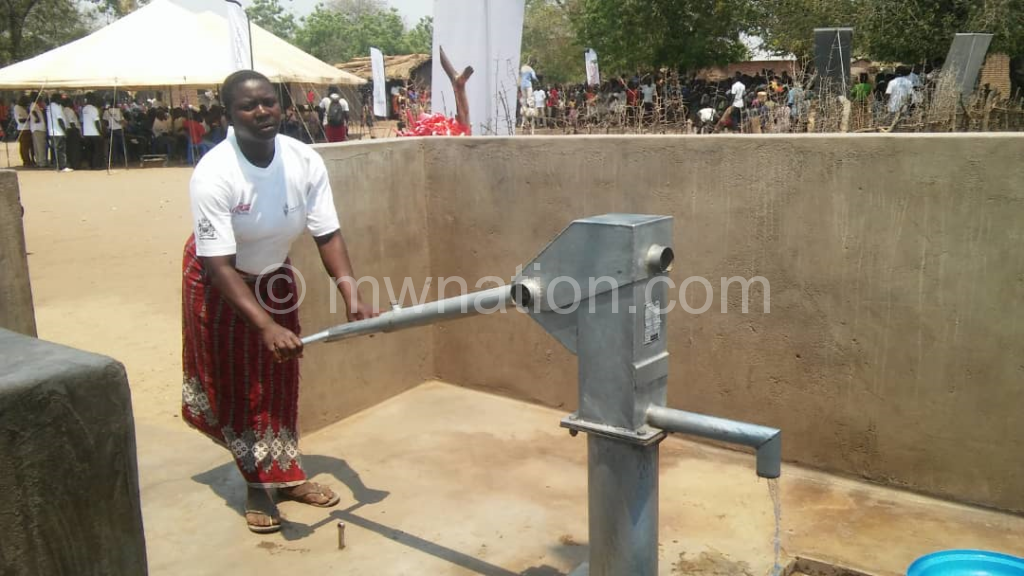Water for everyone
Tucked in a remote pocket of Chikwawa District, Marita Nelson grew up walking long distances in search of safe drinking water. The 28-year-old woman, who lives in Kabotolo Village, used to wake up around 4am to source drinking water at an overcrowded borehole in her flood-prone remote setting in the Shire Valley district.
“Under the scorching October sun or in the chilling weather of June, women, balancing pots on their heads, used to travel far and wide, in search of the precious liquid,” she recounts.

Not any longer.
Water for People has drilled 25 boreholes to ease water problems in 136 villages under Traditional Authority (T/A) Ndakwera. Her village, where several villages that once relied on one borehole, is among the beneficiaries.
They reckon women and girls were worse when the borehole broke down, the locals say.
Nelson used to wake up as early as 4.30am to look for water.
“This usually delayed my children from going to school. They could not leave without bathing,” she explains.
There are seven primary schools in the area and a community day secondary school (CDSS), Tomali.
“Girls were the worst hit. As a girl, I would go to draw water first. I was usually late for classes,” says Melifa Mulingo, a Form Two student at Tomali CDSS.
The new boreholes have brought relief in the villages served by Ndakwera Health Centre, which has no functioning water pump presently.
They want an end to water woes at the facility serves about 35 000 people from six T/As— Chapananga, Ngabu, Lundu, Ndakwera, Maseya and Katunga.
According to health surveillance assistant Edward Jailos, women, including the pregnant, walk long distances to draw water in surrounding villages.
“Ever since the pump broke down, we sometimes spend two days without water and the maternity wing suffers most,” he says.
Sanitation
Apart from providing water close to people, Water for People is empowering the people to embrace improved sanitation.
The villagers have stopped defaecating in the open, they brag.
Nearly every household in Kabotolo Village has a toilet with a hand-washing facility called mpondagiya.
Inside the toilets—comprising brick walls, grass thatches, clay plaster and reed doors—have a lidded hole inside. Outside there is a water bottle hanging on wooden poles where people leaving the toilet wash their hands.
“It is better to have this toilet for hygienic conditions. In the past people in this village had no toilets and sanitation was poor,” says Arnold Mponya, 28.
T/A Ndakwera is happy that families which used to defaecate in the bush have learned to use latrines.
“We are less prone to waterbourne diseases,” he says.
Diseases associated with unsafe water and breakdown in sanitation constitute slightly over half of the diseases treated in the country’s hospital, reports the Ministry of Health.
In 2015, a survey by Water for People found the only 54 percent of Chikwawa’s population—estimated at 600 000—had access to safe water.
Water for all
The same year, Malawi surpassed Millennium Development Goals (MDGs) to provide safe water to at least 75 percent of the population.
With Sustainable Development Goals requiring governments to ensure access to safe water for all by 2030, official estimates show that about a tenth of the population still has no access.
Since 2016, Water for People has been drilling boreholes and promoting community-led total sanitation in Chikwawa with funding from the Coca-cola Foundation.
Water for People country director Kate Harawa urges communities to take the lead in caring for the facilities.
“In return, they will live healthy lives with fewer burdens of waterborne diseases. Besides, girls will attend school and study without worrying about long distances to water points,” she says.
Ntondo Club chairperson in Kabotolo Village Mofolo Nkundula says communities are up to the task. Water for People has trained them to look after the borehole
“We can fix it when it breaks down,” he says.
Water for People also runs similar projects in Chiradzulu and Blantyre.
Victoria Wane, principal administrative officer for Chikwawa District Council, says the 25 boreholes will reduce the long trips women make to look for water.
“This will help improve people’s health,” she says.
Emma Mbalame, the director of water supply and sanitation in the Department of Water Development, says government is determined to achieve SDGs, including goal number six on ensuring water and sanitation for all.
“Initiatives like this project greatly compliment government efforts in the water and sanitation sector,” she says.
Meanwhile, relief is the overriding mood in Ndakwera as safe water is no longer a scarce commodity.





